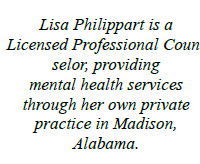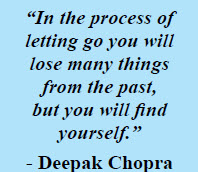 By: Lisa Philippart
By: Lisa Philippart
“In the process of letting go you will lose many things from the past, but you will find yourself.” Deepak Chopra
 In my previous article, we examined the possible origins and types of rumination. As a reminder, rumination is the mental habit of repetitive overthinking about the past or present. In this article, we will look at key insights about rumination as well as tips and tools for dealing with these ruminating thoughts.
In my previous article, we examined the possible origins and types of rumination. As a reminder, rumination is the mental habit of repetitive overthinking about the past or present. In this article, we will look at key insights about rumination as well as tips and tools for dealing with these ruminating thoughts.
Rumination is not healthy reflection. While it is important to think about negative things in the past, healthy reflection means making time to intentionally think about these things with the goal of learning from them and changing future behavior. In other words, healthy reflection is productive. Rumination is almost always reactive, impulsive, and counterproductive. It is also important to note that a ruminative thought is different from the habit of ruminating. Sometimes uncomfortable thoughts about the past simply pop into our minds. That is not something you can or should try to control. When it does happen, the best thing you can do is to briefly (and non-judgmentally) validate them and move on. Alternatively, you can choose to elaborate on and continue thinking about negative thoughts. This is ruminating and is a habit that however powerful, you do have control over.
 As you have probably already noted, rumination is neither helpful nor uncontrollable. The habit of rumination is often maintained by the belief that it is somehow useful or simply inevitable and not something that can be within your control. A helpful way of thinking about rumination is that it is a reflection of your values and the things that matter most to you. If you are in the habit of ruminating about your mistakes as a parent, that’s probably because being a good parent is a strong personal value for you. Reframing ruminations as an indicator of your values can be a productive way to escape unhelpful rumination and start taking forward action instead.
As you have probably already noted, rumination is neither helpful nor uncontrollable. The habit of rumination is often maintained by the belief that it is somehow useful or simply inevitable and not something that can be within your control. A helpful way of thinking about rumination is that it is a reflection of your values and the things that matter most to you. If you are in the habit of ruminating about your mistakes as a parent, that’s probably because being a good parent is a strong personal value for you. Reframing ruminations as an indicator of your values can be a productive way to escape unhelpful rumination and start taking forward action instead.
Now let’s look at some tools for dealing with rumination. Like any unhealthy behavior or bad habit, the key to undoing it is to understand the need it fills and work to get that need met in a healthier way. For example, if depressive rumination about your lack of parenting skills is the habit you want to break, you might identify that the need it’s filling is the desire to feel more confident in parenting. Actually doing something useful, maybe taking a parenting class, would address that need to parent better in a way that is more valuable, and has none of the downsides of rumination like irritability, sadness, stress, etc. Rumination is often a defense mechanism against helplessness…it temporarily makes you feel like you’re doing something, but it’s ultimately counterproductive. You may be less prone to rumination if you are better at being aware of your feelings of helplessness and practice tolerating and accepting them.

Another tip to decrease rumination is to make time to be sad (angry, hurt, etc.) on purpose. This sounds counterintuitive, but ruminating about a loss, for example, can interfere with a healthy grieving process and the ability to accept the loss and move forward. You might carve out 10 minutes a day to sit down and journal about things in your life that make you sad. It may be helpful to have a fixed time and time limit to be validating of the sadness rather than judgmental. And finally, the best way to deal with your mind’s tendency to ruminate is to briefly acknowledge and validate it, then refocus your attention and behavior on something more positive and effective. When in doubt, use the 3Ms to choose a new behavior: Move, Make, and Meet. Do something physical and move your body, make or fix something with your hands, or go have a meaningful interaction with someone you enjoy!
By: Lisa Philippart
Licensed Professional Counselor









 June 20, 2025
June 20, 2025



